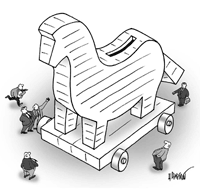| Political parties |  |





| Points of view |  |


| Elections |  |





| Useful information |  |



|  |
Socio-political Movement "Forta Noua" (New Force)

Governing bodies
The Congress is the supreme governing body, which may be ordinary or extraordinary. The Ordinary Congress is convened once a year. The Extraordinary Congress is convened whenever it's necessary, by half of the Political Council members, as well as at the initiative of at least half of the party territorial organizations.
The Congress shall be considered deliberative provided at least two thirds of the delegates elected in accordance with the bylaws provisions attend. The Congress Resolutions are adopted by the simple majority vote of the delegates in attendance. The Congress Resolutions on modifying or completing bylaws and program shall be passed by the vote of at least two thirds of the delegates that are elected to the Congress. The Congress may examine any issue and holds the exclusive right to rule on the following:
- adopting, modifying and completing the program and bylaws;
- electing the Chairperson of the party for a two year term;
- electing Political Council and Revision Commission for a two year term;
- determining the main activities of the party and its strategy;
- hearing and approving the reports submitted by the Chairperson, Political Council and Revision Commission;
- adopting the electoral platforms in view of local, parliamentary and presidential elections;
- deciding on merging other parties or socio-political organizations as well as on party dissolution.
The mandate of all the bodies elected by the Congress expires at the next ordinary Congress.
The Political Council governs the Movement in the time period between the Congresses. The ordinary sessions of the Political Council are convened at least once in trimester and are deliberative provided more than half of its members are present. The resolutions of the Political Council shall be adopted by the simple majority of votes. The Chairperson of the Movement or his/her deputies chair the Council sessions.
As the governing body in the time period between the Congresses the Political Council is entitled to:
- convene extraordinary Congresses in line with the bylaws provisions;
- enforce the strategy of the Movement adopted by the Congress;
- promote the policy of the Movement in its current activities;
- adopt decisions except for the ones in the exclusive competence of the Movement Congress;
- decide on joining political blocs and merger with other political parties;
- confirm candidates lists of the Movement in elections;
- elect from among its members the Executive Bureau (the Chairperson and deputy Chairperson of the Movement are ex officio members);
- delegate responsibilities to the Political Council and members of the Executive Bureau;
- confirm at the request of the Executive Chair the organizational structure of the executive body;
- appoint and oust the employers of the Movement, as well as the Editor in chief and his/her deputy of the party newspaper;
- confirm the set up of new Movement branches in the territories;
- decide on purchase or sale of estate;
- elect at the recommendation of the Party Chair his/her deputies;
- elect at the recommendation of the Movement Chairperson the Director of the Executive Bureau.
The Chairperson of the Movement leads the party activity in the time period between the sessions of the Political Council. The Chairperson exercises the following functions:
- represents home and abroad the Movement in relations with the Parliament, Government and other state institutions, political parties and public associations;
- prepares and convenes the sessions of the Movement's Political Council;
- is responsible for the Movement patrimony and financial resources;
- develops the draft budget of the Movement and submits it annually for the approval of the Political Council, administers financial resources of the Movement;
- submits annually to the Political Council the activity and financial report;
- coordinates the activity of the Executive Bureau and the Secretariat;
- decides on the sphere of activity of the Movement employees and coordinates their activity;
- issues ordinances, instructions, and regulations; concludes collaboration agreements, contracts, acts; designates persons into the Movement apparatus; decides on staff salary, motivates and penalizes the staff.
The Executive Bureau is the Movements' operational body in the time period between the Council sessions. It exercises the following functions:
- oversees under the leadership of the Party Chair the enforcement of the Congress resolutions Political Council decisions;
- develops and approves the quarterly, bi-annual and annual work-plans and oversees their implementation;
- ensures the Movement undergoing activities, coordinates party newspaper publishing;
- keeps liaison with other political parties and socio-political Movements of Moldova;
- adopts internal regulation on the activity of the Executive Bureau and Secretary;
- coordinates the activity of the Movement branches in the territory;
- carries other responsibilities of the Executive Bureau set by the Political Council and Movement Congress.
Socio-political Movement "Forta Noua" (New Force):
Program / Governing bodies / Statistics / Participation in elections
|
 |










|


